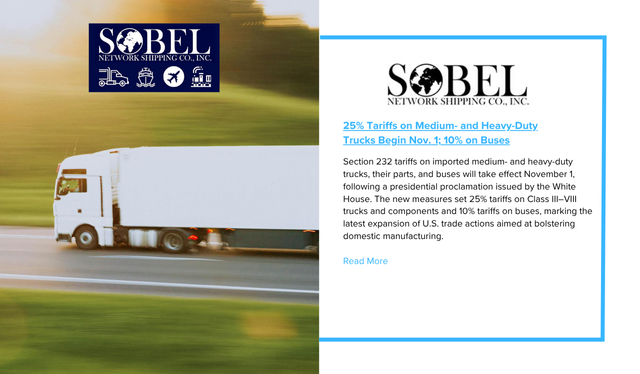Washington, D.C. — Section 232 tariffs on imported medium- and heavy-duty trucks, their parts, and buses will take effect November 1, following a presidential proclamation issued by the White House. The new measures set 25% tariffs on Class III–VIII trucks and components and 10% tariffs on buses, marking the latest expansion of U.S. trade actions aimed at bolstering domestic manufacturing.
According to administration officials, trucks imported under the U.S.-Mexico-Canada Agreement (USMCA) will receive partial relief: only the non-U.S. content will be subject to the 25% duty, while U.S.-origin content will remain exempt. However, buses will not qualify for preferential treatment, meaning the full vehicle value will face the 10% tariff.
Truck and bus parts imported from Mexico or Canada will continue to enter duty-free, provided they meet USMCA rules of origin. The Commerce Department intends to develop a future framework to apply tariffs to the non-U.S. value of imported parts used in final assembly, but no methodology has yet been established.
For domestic producers, manufacturers assembling medium- and heavy-duty trucks in the U.S. will be eligible for a 3.75% offset of the manufacturer’s suggested retail price (MSRP) to compensate for previously paid part tariffs—mirroring existing credits available to automakers. Heavy truck engine makers will also qualify for this offset, which will remain in place through 2030.
In addition, aluminum and steel sourced from Canada or Mexico — if smelted, cast, melted, or poured in those countries — will be subject to a reduced 25% tariff rate instead of the standard 50%, though the Commerce Department plans to cap the exemption based on projected U.S. production growth.
The proclamation also extends to used and remanufactured trucks and buses manufactured within the last 25 years. Meanwhile, Japanese and European truck and engine parts will face an all-inclusive 15% tariff, instead of the 25% rate applied to other non-USMCA imports.
Trade analysts say the move underscores Washington’s continued use of tariff instruments under Section 232 of the Trade Expansion Act, aimed at enhancing national security and strengthening the domestic supply base for critical transportation sectors.


